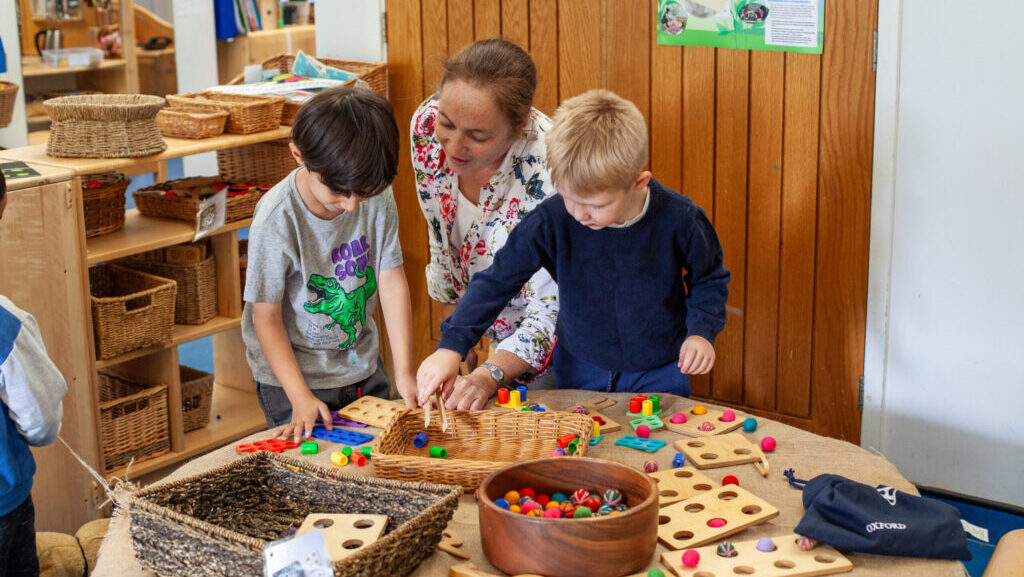Anthony Newman, senior specialist relationship manager at Allica Bank, examines the finance challenges for the nursery sector
Reflect and learn
Upskilling your team to engage in reflective practice and action research can boost staff retention and wellbeing, as well as the quality of provision. Charlotte Goddard finds out about a new resource

Reflective practice is the process of thinking about and analysing your practice, with the aim of challenging, developing and improving it. In a similar way, action research involves considering what needs to be done, taking action, and reflecting on the result.
While sending a practitioner on a training course may upskill them in one particular area, equipping your team to reflect on what they are already doing and take action to improve it sets off a continuous cycle of professional development.
“Staff are your most expensive resource, but also the best resource you have, so when you are leading teams you try all sorts of different things for professional development,” says Sally Cave, headteacher at Guildford Nursery School and Family Centre. “You can send them on training courses, but when they are leading their own learning it has much greater impact on practice improvement, confidence, professionalism and expertise.”
For the past three years Guildford Nursery School and Family Centre has been working with New Zealand kindergarten Seven Stars and charity the Centre for Research in Early Childhood (CREC) in a partnership funded by the Froebel Trust. The initial aim of the project was to research and document the effect and benefits of a Froebelian approach on children, families and educators.
Over the three-year period the settings, supported by CREC and educationalist Professor Tina Bruce, took part in a range of action research projects, including listening to children’s voices when they came back from the first lockdown, engaging with nature and play, and exploring community.
CREC supported educators in both settings to develop their skills as researchers and to analyse, document, reflect on and disseminate their findings. “It was very democratic and inclusive, we gave practitioners the vocabulary and means to look more deeply into what they were doing anyway,” says Professor Chris Pascal, co-founder and director of CREC.
The partners learned so much over the course of the programme that they decided to create a free toolkit to enable other settings to engage in reflective practice. “The idea is we use this reflective approach to help others work in the same way, and develop that reflective community in every setting,” says Pascal.
Reflection with Guidance, available on the Froebel Trust website, is an interactive resource including videos, photos, text and templates. “It aims to support educators to constantly learn through reflecting and professionally discussing what they have observed and what the children have done,” says Cave. “It does take time to use, and while that is a cost in itself, the toolkit is free, there isn’t an expensive trainer you have to buy in, and there are no expensive resources you need.”
The toolkit is aimed at leaders and managers in any setting – not just those following Froebelian practice – who will work through the resources with their team. “It can be used by setting leaders who wish to develop their team’s understanding of children’s development and learning,” says Cave. “It helps leaders to support and develop the team’s ability to observe and document practice and improve practice. It can also support whole-setting improvement.”
Practitioners are encouraged to decide what aspect of practice or provision they want to analyse, such as a particular area of the learning environment, and gather data through observations. The toolkit provides a number of prompts to help guide practitioners’ thinking, listed under four ‘lenses’: ‘context, space, time and seasons’; ‘actions actors and relatedness’; ‘the network of development and learning’ and ‘transformations’. If practitioners look at the use of an outdoor area, for example, they might look ‘through’ the first lens at how it is used at different times of the day, and through the second lens they might consider which children play there and how they interact with adults and each other.
The toolkit provides templates for educators to note down their findings, and support around reflecting on the findings to consider the next step, with discussions ideally facilitated by leaders and managers, or practitioners from another room. They can then make the agreed changes in the setting, or to their own practice.
“You could use it in whole teams, small groups, or even as a single person working alone,” says Cave. “However, it’s even better if you have someone external involved, or someone slightly removed, because they can ask those more challenging questions.”
The resource has already been trialled in six different settings, and tweaked according to their feedback. “They said some of the terminology needed explaining, so we’ve added a glossary,” says Cave. “We are also going to record ourselves introducing Reflection with Guidance for those people who don’t necessarily like to read cover to cover.”
Changes made in settings which have already used the toolkit include a realisation of the need to talk through observations with parents, and changes made to the environment, such as placing the mud kitchen in a more enclosed area.
“This toolkit can be supportive and transformative at what is a challenging time for our sector in terms of funding, recruitment, retention and staff wellbeing,” says Cave. “At our setting we have seen improved staff retention and ever-increasing levels of wellbeing.” A survey found that 100% of staff at the setting enjoyed work and felt valued, and feedback from users suggest after using the toolkit educators were better able to describe what they were doing clearly and coherently, especially when talking to parents, colleagues and inspectors.

“We have had no work stress-related absences at all for last three years,” says Cave. “Of course people still get sick, but at one point when I first arrived here I contemplated doing a staff meeting on avoiding food poisoning, as so many people seemed to come down with food poisoning over the weekend,” she laughs. “That doesn’t happen anymore.”
The boost in staff wellbeing is linked to an increase in confidence and a feeling of ownership, she says. “I can’t make people happy – things happen in their personal lives and we all have difficult things to deal with, My job is to give my team high job satisfaction, and for that you have to give people autonomy. They decide what they are going to be looking at, and they decide what they can do differently.” Often while engaging in reflective discussion, educators come to a better understanding of their own expertise, which can lead to improved confidence.
“It is about putting practitioners in the driving seat,” says Pascal. “They told us being acknowledged in that way helped them grow professionally, they had more of a sense of where want to go in their career, their stress levels are lower, they enjoy work more – they are more enchanted with their job again. When you feel a sense of belonging to a group with shared values you have more confidence, dignity and status.”
The approach can be used by a whole team, from the most to the least experienced. “It doesn’t matter if you are early in your career or experienced, whereas sometimes if you go on a course, it may be a bit too advanced for some,” says Cave. “You get different discussions depending on who is involved – older people can pass on their experience, but often younger people have a different perspective to offer.”
Although the funding has now run out, the partners hope to carry on with the project. “This kind of development opportunity should be everywhere,” concludes Pascal. “This is a vehicle for enhancing professional development, which is something that our workforce needs desperately.”
BOX: Froebelian principles
Friedrich Froebel (1782 – 1852) was the inventor of kindergartens and a pioneer of early childhood education and care. His key underlying principles include viewing childhood as having a value in its own right, rather than being merely a preparation for the next stage in learning, the central importance of play, and the value of understanding nature and our place in it.
Froebel believed that the starting point of a child’s learning should focus on what they can do rather than what they cannot and that children learn best by doing things for themselves. Early childhood educators who engage in their own learning and believe in principled and reflective practice are a key aspect of a Froebelian approach.
Latest Features
Jordan Tully, managing director of Toots Day Nursery Group and founder of the ‘Exploring Early Years With Jordan Tully’ podcast…
Georgina Bryant, corporate and commercial partner at solicitors firm Barcan and Kirby, sets out some of the problems associated with…




